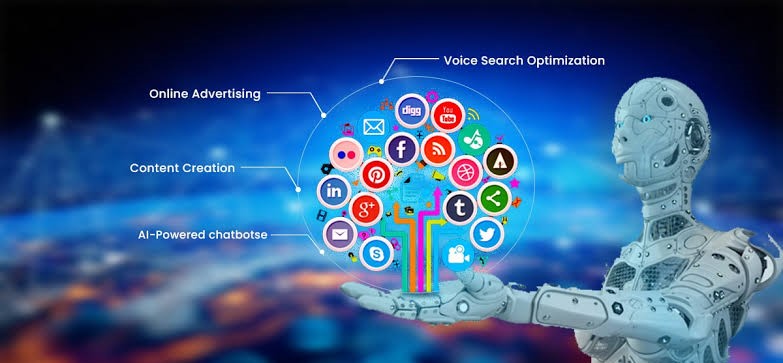Digital marketing has evolved significantly, thanks to technological advancements that have revolutionized the way businesses interact with their audiences. Here’s a look at some key developments, from AI to AR, that have shaped the landscape:

Artificial Intelligence (AI) in Digital Marketing
- Personalization: AI enables highly personalized marketing experiences through data analysis, predicting consumer behavior, and delivering tailored content.
- Chatbots and Virtual Assistants: AI-powered chatbots provide instant customer service, answer queries, and even guide purchasing decisions.
- Predictive Analytics: AI analyzes historical data to forecast trends, optimize ad spend, and improve ROI.
Machine Learning in Digital Marketing
- Dynamic Content: Machine learning algorithms adjust content and offers in real-time based on user interactions and preferences.
- Customer Segmentation: Advanced algorithms help in identifying and segmenting customers more accurately, allowing for more targeted campaigns.
- Programmatic Advertising: Machine learning automates the ad buying process, optimizing ad placements and targeting.
Augmented Reality (AR) in Digital Marketing
- Interactive Shopping Experiences: Augmented Reality (AR) makes shopping more fun and interactive by letting you try products virtually. Whether it’s trying on clothes or testing out makeup, you can see how things look on you before you buy them, making shopping easier and more exciting.
- Enhanced Product Visualization: Brands use AR to showcase products in 3D, helping customers visualize items in their real-world context.
- Immersive Brand Experiences: AR creates unique, immersive experiences, engaging customers through interactive storytelling and gamification.
Virtual Reality (VR) in Digital Marketing
- Virtual Showrooms: VR offers virtual tours of products, real estate, or travel destinations, providing an immersive experience.
- Experiential Marketing: Brands use VR to create memorable experiences, from virtual events to immersive storytelling.
Blockchain in Digital Marketing
- Data Security: Blockchain technology helps keep our personal information safe and secure. It addresses privacy concerns by ensuring that our data is protected, which in turn helps build trust between consumers and businesses.
- Transparency: Blockchain provides transparency in ad transactions, reducing fraud and ensuring ad spend reaches its intended audience.
Voice Search and Smart Speakers
- Voice SEO: With more people using voice-activated devices like smart speakers, businesses are focusing on making their content easy to find through voice search. This means they’re thinking about how people naturally speak and ask questions, so you can get the information you need just by talking to your device.
- Voice Commerce: Brands are exploring voice-activated shopping, providing a hands-free purchasing experience.
Social Commerce in Digital Marketing
- Shoppable Posts: Social media has made shopping even easier with shoppable posts. Now, you can buy products directly from the posts you see on your feed. If you spot something you like, you can just click on it and make a purchase right there, without leaving the app. It’s a simple and convenient way to shop while you scroll.
- Influencer Collaborations: Brands collaborate with influencers to reach wider audiences and leverage their followers.
Internet of Things (IoT)
- Connected Devices: IoT devices collect data on user habits, providing insights for personalized marketing.
- Smart Advertising: With the Internet of Things (IoT), businesses can offer smart advertising by using location data. This means they can send you promotions and special offers in real-time, based on where you are. It’s like getting a personalized deal just when you need it.
Data Analytics and Big Data in Digital Marketing
- Customer Insights: Big data analytics provides deep insights into consumer behavior, helping brands make data-driven decisions.
- Optimized Campaigns: Data analytics tools optimize marketing campaigns, improving targeting and effectiveness.
Ethical Considerations
As these technologies evolve, ethical considerations around data privacy, transparency, and consumer consent become increasingly important. Brands must navigate these challenges while delivering innovative and engaging marketing experiences. These shifts demonstrate how technology continues to reshape the digital marketing landscape, offering new opportunities and challenges for brands and marketers.


Leave a Reply